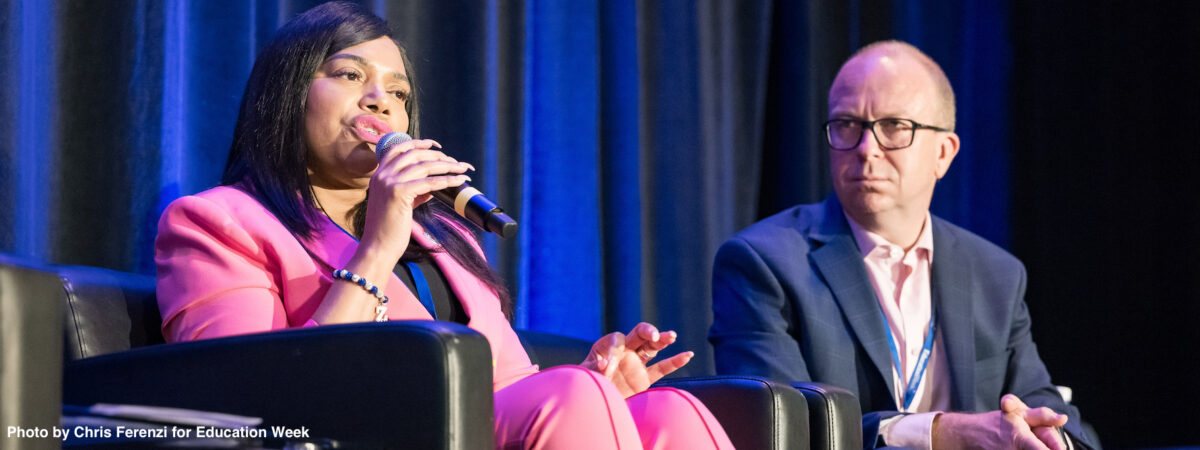
This call for bold leadership is particularly timely as the K-12 education landscape continues to undergo radical transformation: technology is disrupting traditional methods, future workforce demands are constantly evolving, and a globalized world is underscoring the need for students to be adaptable and collaborative. For education leaders, these changes demand a move beyond incremental change. We need visionary, courageous, and collaborative leaders who can foster environments where educators feel empowered to experiment with new technologies, personalize learning experiences, and equip students with critical thinking and problem-solving skills needed to find success in the path of their choice.
The EdWeek Leadership Symposium offered a wealth of insights that directly spoke to these pressing realities. Several key themes resonated with me and demonstrate the need for interconnected networks of education leaders, like the League of Innovative Schools.
A skilled and motivated teaching force is the cornerstone of success in education. The panel discussion, “The State of Teaching: Big Takeaways for School and District Leaders,” highlighted the current realities of the teaching profession and educator perceptions and needs around professional learning. Leaders discussed strategies for creating pathways for aspiring educators within their own districts and approaches to creating a more satisfied workforce of educators.
We see innovative approaches to addressing challenges within the teaching profession across League districts. Lindsay Unified School District (California), for example, is addressing teacher shortages in rural California by “growing their own” through a pipeline and credentialing program, which provides pathways for graduates to earn teaching certifications and return to their communities to teach.
Responsible AI integration offers immense potential. AI can personalize learning, provide targeted support, and empower educators with valuable data. However, ensuring equitable access is paramount to ensure we don’t widen existing disparities. In a panel discussion, “Embracing AI in Education,” speakers explored practical and philosophical considerations around AI, emphasized “smart and responsible” AI use, and highlighted the need for clear policies and guidance for users.
While AI offers immense potential, ensuring equitable access and responsible implementation are critical for success. The ethos of this conversation aligns with the League’s commitment to innovative practices that benefit all learners. For example, League districts are actively developing AI policies that ensure all students benefit from this powerful tool.
Strong school-family partnerships are essential. The “Leadership Interview: What Happens When School and District Leaders Prioritize Family Engagement” session underscored why it’s so important for education leaders to build relationships and collaborate with families. Leaders discussed fostering a sense of connection and shared responsibility for learning between families, educators, and the school community.
Districts across the League of Innovative Schools are adopting a holistic, community- and family-centered approach to addressing challenges in education by partnering with Digital Promise’s Center for Inclusive Innovation. Through this work, League districts leverage the Inclusive Innovation research and design process to understand complexities across diverse contexts, develop tailored solutions, and improve student outcomes through data-driven strategies, recognizing the crucial role of family engagement.
The EdWeek Leadership Symposium powerfully demonstrated that collaboration is the engine for change in education. By sharing ideas, learning from each other, and tackling shared challenges, educational leaders can create a more innovative and equitable learning environment for all students.
This symposium wasn’t just about the present; it was about charting the course for a brighter future of education—a future built on collaboration, innovation, and a shared commitment to student success.
Are you an education leader interested in connecting and collaborating with other forward-thinking leaders? Consider applying to the League of Innovative Schools, which accepts applications annually in the spring.
In the meantime, you can stay connected with the League by:
Digital Promise was proud to serve as a sponsor for the Education Week’s 2024 Leadership Symposium. This blog post was not a part of the sponsorship agreement and reflects the viewpoints of Digital Promise staff.